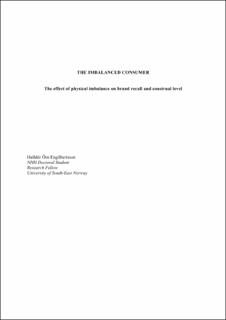The Imbalanced Consumer: The Effect off Physical Imbalance on Brand Recall and Construal Level
Doctoral thesis
Permanent lenke
https://hdl.handle.net/11250/3071279Utgivelsesdato
2023-06Metadata
Vis full innførselSamlinger
Sammendrag
The role of physical imbalance in consumer behavior is an understudied topic in consumer
psychology. This dissertation investigated the effect of physical imbalance on consumers. In a
consumer environment, imbalance can be activated in various ways, such as when consumers
struggle to walk on wet floors, icy sidewalks, miss a step, travel, or walk in a virtual space. This
dissertation hypothesized that momentary loss of physical balance reduces consumers´ capacity to
recall brands from memory. The finding extends research on subjects with balance impairments by
testing this proposition with young and healthy consumers. Consumers and practitioners should
know whether the number of recalled brands decreases when physical imbalance is experienced.
Recognizing that imbalance is a source of cognitive load, consumers and marketers can benefit
from understanding whether the remaining capacity becomes subject to limitations. According to
Construal level theory, consumers perceive available choice alternatives as more viable when
proximal sensations are dominant. This dissertation tested the proposition that imbalance reduces
cognitive capacity and demands abrupt proximal action, prompting consumers to prefer low
construed proximal choice alternatives. The first study suggested that consumers’ find their mental
performance to be reduced during imbalance. The study found scant evidence for a decrease in the
retrieval of brands from memory among young and healthy consumers. Subsequent studies tested
whether imbalance could instigate a preference for low construal choice alternatives. The following
two studies highlighted the need to improve study design and measurement. The final study found
that imbalanced participants were more likely to choose certain smaller monetary rewards in the
present over higher, more uncertain future rewards. The finding suggests a small effect of proximal
sensation prompting a preference for lower construed alternatives. A single-paper meta-analysis
suggested that the evidence for the proximal sensation of imbalance on psychological distance is
weak. Alternative explanations about consumers´ certainty, mood, and self-efficacy were also
tested. None of the alternative relationships were significant. The findings from this dissertation
contribute to the literature by pinpointing the complexities of physical balance as a symphony of
sensory interactions rather than a mere conceptual metaphor. This was the first study in consumer
psychology to test the effect of physical imbalance on young and healthy adults as a demanding
sensory state. The dissertation demonstrated that measuring the effect of proximal sensation of
imbalance requires technical skill and resources. It contributes to consumer psychology by
concluding that imbalance does not have a significant effect on the retrieval of brands or preference
among young consumers. The study of imbalance will continue to be relevant for consumer
research as aging populations are more likely to suffer from imbalance impairments while the use
of balance-demanding virtual reality is increasing in popularity.
